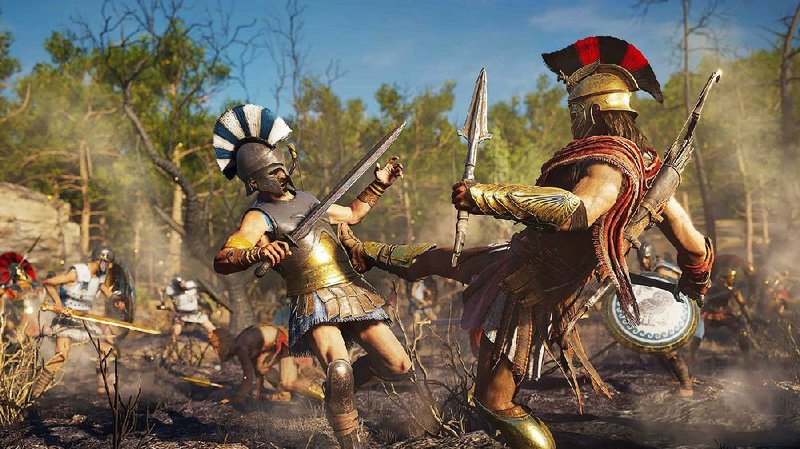Title: Assassin's Creed: Odyssey
Platforms: Windows, PlayStation 4 and Xbox One
Cost: $59.99
Rating: Mature for blood and gore, intense violence, sexual themes and strong language
Score: 8.5/10
In the aptly titled game Assassin's Creed: Odyssey, players will set out on an epic adventure, assassinating high-ranking officials, fighting fierce naval battles on the high seas and battling fantastical creatures straight out of Greek mythology.
Odyssey is a sequel to last year's Assassin's Creed: Origins, which took place in Ancient Egypt. This time the game is set 400 years earlier during the Peloponnesian War between Sparta and Athens.
Assassin's Creed games follow parallel storylines — one set in the modern day, the other in the past. In Odyssey, you have the choice of playing as Alexios or Kassandra, sibling mercenaries driven to reunite their family and stop an evil cult while wielding the broken spear of Spartan King Leonidas.
The modern-day story drags a bit, as it involves a lot of dialogue and reading emails, which isn't nearly as fun as lighting an arrow on fire and shooting a 15-foot-tall Cyclops in the eye with it. The gist of the story, though, is that you're actually researcher Layla Hassan, who is using a device called the Animus to experience the past, and there's an ongoing feud between two groups — the Assassins (who are the good guys) and the Knights Templar, who are bent on world domination using legendary artifacts from the past.
In making Odyssey, developer Ubisoft Quebec has gone bigger and bolder. The open-world map is twice the size of last year's Origins.
Traversing it from corner to corner on foot takes more than two hours. It's made with the same game engine as Origins, so graphically it's pretty similar, and combat works, for the most part, the same way. There are at least 80 hours of content available, counting the main, storyline quests as well as side missions, and other, optional, missions are being added on a daily and weekly basis, giving Odyssey a lot of replayability.
Dialogue options have a meaningful effect on the story. Early on, the player is faced with a dilemma when confronting a soldier who is about to kill a family that's sick with a plague. You've been asked by a young girl to save her friend, but if you stop the soldier from killing the family, the plague might spread, killing hundreds or thousands more.
There's a lot to do in Odyssey, and the influences of other major titles in the series are readily apparent. Stealing, killing civilians or attacking soldiers will increase a bounty level on the player, meaning strong mercenaries will be dispatched to hunt you down. It's basically a "wanted" level similar to the Grand Theft Auto series. The bounty on a player can be reduced over time, by paying a fine or by assassinating the person who put the bounty on you.
The Nemesis system from the game Shadow of Mordor also seems to have been poached, as players can capture strong warriors and put them to work as lieutenants on a ship to improve its naval combat abilities. And in times of trouble, those lieutenants can be summoned to fight alongside you in battle.
The naval warfare is pretty great — your sailors sing sea shanties, shooting flaming arrows and javelins at enemy vessels amid towering waves in the open sea.
Odyssey does get a bit bogged down with its emphasis on numbers, though, in a way that seems similar to the Destiny series of games. Simply put, if your enemies are at a higher level than you are, it's almost impossible to kill them, no matter what kind of gear you have, because your attacks will do almost no damage, and theirs will do more. Fight an enemy five levels higher, and you might hit him scores of times and not kill him, but one swing from him can end you.
The only solution is to grind out experience points, which can be, well, a bit of a grind.
And that brings us to microtransactions — Ubisoft will let you pay — real money — in a single-player game, to get permanent or temporary boosts to experience points and currency.
It's like they made leveling-up annoying on purpose, to extract a little more money from players.
If you're going to give players a choice on how fast to earn experience, why charge them extra for it?
Overall, Odyssey is pretty satisfying. There are sacrifices to historical authenticity, however — in the name of fiction and inclusiveness. But the multiple combat styles, a revamped skill system, numerous romance options and the fascinating world to explore — especially if you're a fan of Greek mythology — make this a game worth checking out.
Style on 10/22/2018

